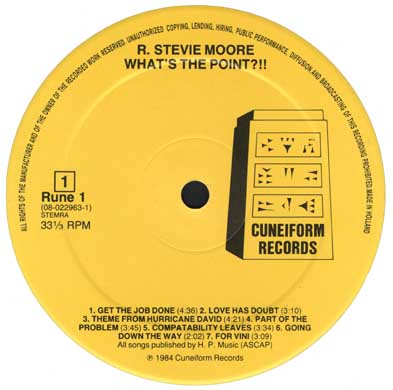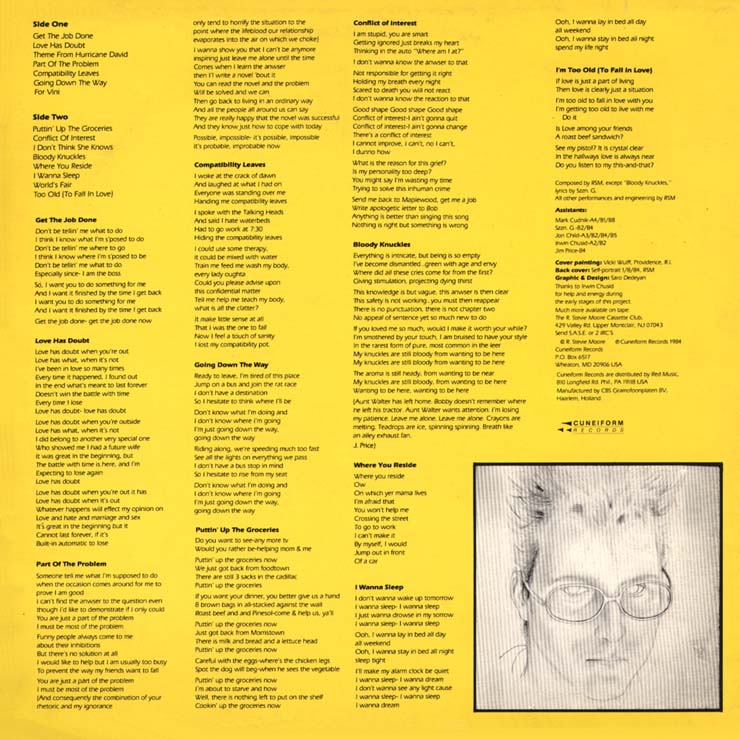WHAT'S THE POINT?!!
~Fourth Album~
Cuneiform RUNE 1 (LP)
Issued June 1984
LYRICS
- 01. GET THE JOB DONE (4:40)
- 02. LOVE HAS DOUBT (3:15)
- 03. THEME FROM HURRICANE DAVID (4:18)
- 04. PART OF THE PROBLEM (3:49)
- 05. COMPATIBILITY LEAVES (3:36)
- 06. GOING DOWN THE WAY (2:07)
- 07. FOR VINI (3:18)
- 08. PUTTIN' UP THE GROCERIES (3:01)
- 09. CONFLICT OF INTEREST (2:46) VIDEO
- 10. I DON'T THINK SHE KNOWS (1:29)
- 11. BLOODY KNUCKLES (3:44)
- 12. WHERE YOU RESIDE (1:56)
- 13. I WANNA SLEEP (3:08)
- 14. WORLD'S FAIR (2:33)
- 15. TOO OLD (TO FALL IN LOVE) (3:07)
CD Bonus Tracks:
- 16. WHAT'S THE POINT (2:51)
- 17. PART OF THE PROBLEM (INST) (3:39)
- 18. I DON'T THINK SHE KNOWS (VCL) (1:00)



SOUNDS (U.K.)
Issue dated 18 Aug 1984
***** (Five stars)
"POINT TAKEN"
by Jack Barron
 WHILE BIG People continue
WHILE BIG People continue
to suffocate in the trash-can
of opportunity, eating and
spewing muck, the little
people understand, record
companies included.
It's all here! And here is
where the longest (relatively)
undiscovered pop genius on
the globe waxes with wonder
on Cuneiform's debut foray
into the tacky world of
competitive capitalism.
If you read the recent
review of R. Stevie's New
Rose collection, "Everything
You Ever Wanted To
Know...", you'll be familiar
with his touch. If you didn't,
here's a brief resume.
Maverick son of Bob
Moore, the Nashville bassist
who graced discs by greats
from Elvis and Jerry Lee
Lewis to Willie Nelson, R.
Stevie swallows a dynamite
tab of the British Sixties
invasion, turns his back on a
potentially profitable career
as a country session player,
and decides to become a DIY
Sergeant Pepper instead.
With the help and
encouragement of his uncle
Harry Palmer, catalyst behind
a psychedelic group called
Ford Theatre, R. Stevie
wired up a couple of tape
recorders and blows on
rented instruments.
A trio of remarkable
albums follow,
"Phonography," "Stance" and
"Delicate Tension," all on
Harry's HP (saucy) label.
Eventually, the maverick
transports himself and his
recorders to New Jersey.
Still the ideas keep on
coming, far too many for
Harry to handle. So R. Stevie
formulates a cute solution
and establishes his own
cassette club.
Major record companies,
however, continue to find the
man's eclecticism difficult to
fathom, New Rose, the indie
with a French nose for
strange musical perfume,
empathizes with his plight and
the retrospective
"Everything..." results.
It's brilliant, and everyone
has a field day trying to put a
name to the beast. Todd
Rundgren, Eno, Fripp, Syd
Barrett, the Residents ad
nauseum are all cited as
reference points. This new
album should help clear
these comparisons up for it
has a definite unity of vision.
The title is a clue. This is a
record of depression in the
traditional singer-songwriter
mould, only it doesn't whine
or feel sorry for itself. It
doesn't shriek "Look at my
pain, I must be a great artist."
Rather "What's The Point?!!"
is a wry and cutting
document of a man with
problems who hasn't lost his
sense of humour.
As you'd expect, the sound
quality leaves a lot to be
desired. But this doesn't
matter for the songs are far
more affecting in sentiment
than, say, Costello's
"Goodbye Cruel World." And
that's the point. So help
cheer up R. Stevie and join
his one-man lonely hearts
club band.
The Moore the merrier.
MELODY MAKER (U.K.)
Issue dated 25 Aug 1984
by Barry McIlheney
SEEMS like our Stevie is
something of a minor cult
figure over there in the U.S. of
A. The reason for this
somewhat strange state of
affection is not too hard to
work out once you think
about it. Our American
cousins have had to live with
all forms of grossness for so
long now that the wonderfully
minimalist Mr. Moore must
have seemed like an eccentric
gift from the gods. A sort of
one-man Ramone, Vince Clark
without the haircut, early Van
Morrison without the songs.
And there are, admittedly,
certain glimpses on this
album which hint at why the
Yanks are having this low-
profile love affair with the
solitary Steve. "Part Of The
Problem" could easily have
made a memorable few
moments, if only Stevie didn't
feel it necessary to skirt half a
dozen styles along with the
same number of time
changes in the space of a
single song. It starts with a
great sub-REM guitar break,
throw in a "Badge"-type
descending blast, but then
sadly sinks without trace as
soon as the funny vocals
come in. Shame.
Still, everything on this
album was written and put
together by Stevie Moore,
and all apparently recorded
on a little tape machine in a
loft no doubt stuffed with
egg boxes. Such spirit alone is
to be heartily welcomed,
especially when it results in a
sure-fire garage bash winner
like "Going Down The Way",
a sign of what this maverick
can do when he puts his mind
to it.
Doing the same thing
yourself might not be that bad
an idea.
BOSTON PHOENIX (U.S.)
Issue dated 22 May 1984
***¼ (Three and a half stars)
by Mark Moses
Cellars by console light, or the
story of a boy and his tape machines.
The recent New Rose import documents
a Nashville native who has been steadily,
almost obsessively, producing idiosyncratic
pop music as if it were a cottage industry.
But if it tries to cast Moore as a whimsical
hermit, a coy Zappa clone, it also demon-
strates the breadth of sources he com-
mands, from headbanger guitar riffs twisted
with jazz fluidity ("Play") to jangly free-
associations ("Compatibility Leaves").
The forthcoming Cuneiform LP (which
picked through 300 songs for its 14 prime
selections) is the most rounded introduc-
tion to this not-so-lovable recluse; here the
eccentricities and the crank misanthropy
are allowed to obscure Moore's musi-
cianship or his catholic taste. Even the
sound of one man clapping needs an editor.
OP (U.S.)
"Z" Issue (1984)
by Charlie Newman
Moore works within pretty standard song forms, nothing terribly
earth-shattering or too avant. His lyrics stray further from
the usual, but not into the terminally bizarre. You can tell
what he's talking about without the aid of recreational phar-
maceuticals. So what makes his music so special? He does
things within the standard forms that alter and slightly mutate
them into something truly interesting. You hear echoes of
Frank Zappa fairly often. And similarities to John Bender
Plaster Falling and Arthur Harrison/Rupert Chapelle Jobs
For America. But Moore isn't derivative and he doesn't wear
his influences--whatever they may be--on his sleeve. Ob-
viously not recorded on the latest hi-tech, 64-track digital,
laser poo-bah machinery--you hear plenty of aberration
sounds, courtesy of track pinging and analog processing.
Kinda neat. A lot of the so-called experimental guys could
learn a lot from Moore. Recommended.


